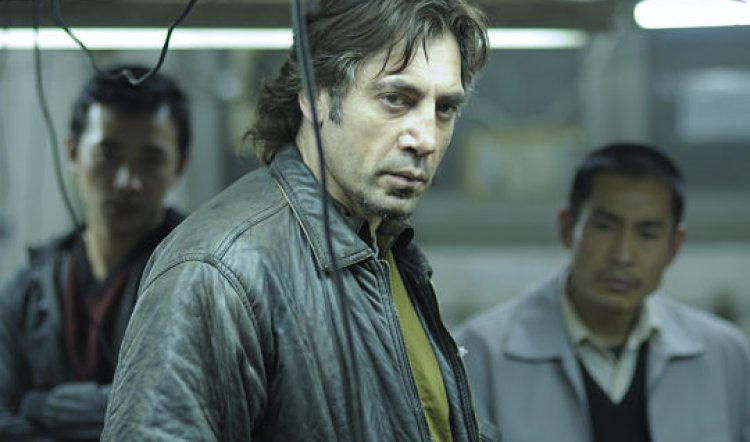
BIUTIFUL
BIUTIFUL, directed by Alejandro Gonzales Inarritu; starring Javier Bardem, Maricel Alvarez. Rated MA, 2 hours 27 minutes
TO COME out of the cinema blinking in the sunlight and dazed momentarily by the task of finding your way back to your own reality is to understand the total immersion achieved by director Alejandro Inarritu and his ensemble in this remarkably gripping film.
Biutiful really is extraordinary. Unmissable. One of the best films I’ve seen. And from Javier Bardem, one of the most soul-searing performances. Which is not to say the film is perfect, but its imperfections, if such they are, come from its furiously impassioned determination to haul us body and soul into the here and now of one particular manifestation of the roiling melee of modern times, so that we can see – up-close and harrowing – the lives being lived within its heartbreak horizons. The spectacle itself may not be beautiful – Inarritu doesn’t do feelgood – but beautiful is certainly the word for his storytelling here. Slipping effortlessly between moments of sheer poetry and scalding reality as he charts the fate of one desperate, driven man, he creates in the process a powerful meditation on the human condition, circa the unforgiving 21st Century and its grim global backstory.
This is a world in which grinding poverty, and scamming to survive it,are givens. Bardem’s Uxbal is a man who spends his days running and stumbling to keep ahead of the disasters piling up in his life. A street hustler, he lives in a cramped corner of his rabbit warren of a neighbourhood, a teeming babel jammed with refugees and illegals that exists in the shadowlands of a Barcelona far removed from the photogenic tourist trail.
Separated from his unstable wife, Uxbal is trying to keep an eye out for her while scrabbling for some semblance of normalcy for his children. He’s also trying to make a buck any way he can, an out-of-his-depth middleman for hard case crims, lining up illegals to work in sweatshops and dodgy building projects, telling himself that because he knows some of the workers and they need the money it’s okay to turn a blind eye to the base-grade slavery – and danger – that is the reality in these shonky workplaces. He is also starting to realise that having ignored the danger signs, he is seriously ill, and perhaps running out of time. And since a dash of magic realism in Inarritu’s tale means Uxbal possesses a strange psychic gift, he is more than usually in touch with mortality and the fact that choices, and their ill considered consequences, must in the end be squarely faced.
Bardem is on screen for almost every scene, his badly flawed and increasingly frantic character by no means a candidate for redemption of the kind a lesser moviemaker might be tempted to bestow on a hero so in need of a break. Instead, the appeal of this character – and our concern for him – is embedded in the absolute conviction of Bardem’s portrayal of a man impossibly up against it and simply doing the best he can. That there are fleeting moments of warmth and fellow feeling along the way is the most that can be hoped for.

Many will remember the excitement generated by Inarritu’s galvanising debut Amores Perros, which signalled with such flash and dash the arrival of the brilliant young Mexican director back in 2000. The buzz generated then inevitably led to Hollywood clout and big name enthusiasm (Brad Pitt and Cate Blanchett in Babel, Benicio Del Toro, Sean Penn and Naomi Watts in 21 Grams). Like Amores Perros, those were complex stories unfolded in multi-layered narratives, with a shared humanity emerging as the underpinning, and while they were films of substance, they didn’t hit the same mark.
This time around, Inarritu’s trademark intensity is back at Amores Perros pitch, though he has wrangled the genie with a lot more control. He is also working in Spanish again, as is Javier Bardem (his soul mate, he says, on this heartfelt project), and it’s hard not to feel that they both seem more at home. Certainly the Spanish language movie milieu has seen Bardem deliver some of his best performances, and this is surely the finest. Ironic in a way that, while the sustained characterisation he delivers here failed to win an Oscar (as did the film itself), he did score gold for the crowd-pleasing cameo of weirdness he produced in No Country For Old Men. (For this viewer, for all the strength of that film, the bizarre bob the Coen brothers saddled him with should alone have ruled him out of contention.)
Inarritu has spoken and written eloquently about his ongoing fascination with the communities that have mushroomed behind the facades of the great cities of the world in response to the shape-shifting economic realities of the global environment; the endless march of refugees and the armies of illegal workers feeding the maw of globalised industries at the expense of human lives. His film’s vivid visuals replicating that world are equally eloquent, thanks in large part to the electrifying photography of Rodrigo Prieto, collaborator on all his films.
The film’s agenda-driven undertow brings to mind Italian director Matteo Garrone’s gritty 2008 film Gomorra. Documenting organised crime (and establishment links) operating in the underbelly of Naples, Garrone’s angry intent lines up with Inarritu’s determination to aim a killer punch at our comfortable assumptions at a time when the divide is escalating between the world’s high fliers and the human casualties at the down and dirty end of their greedy machinations. Biutiful is a tough film. Inarritu has called it a requiem. And the fact that his preoccupation with the human impact of globalisation has morphed into crusading concern echoes like a muffled drumbeat throughout. More power to him.



